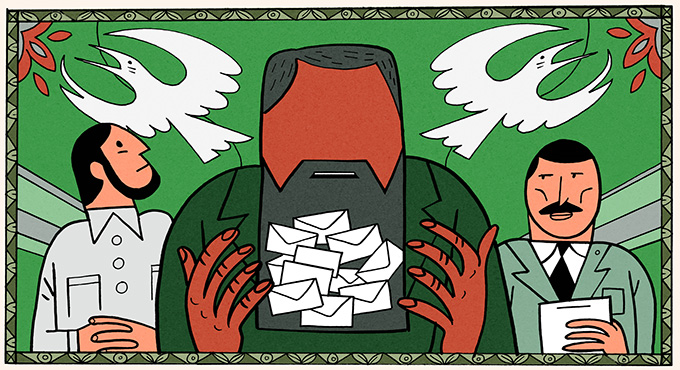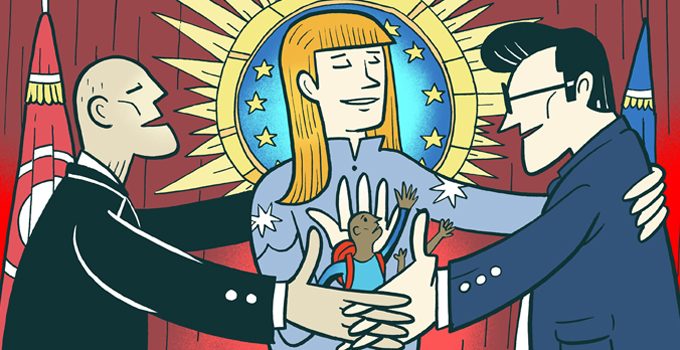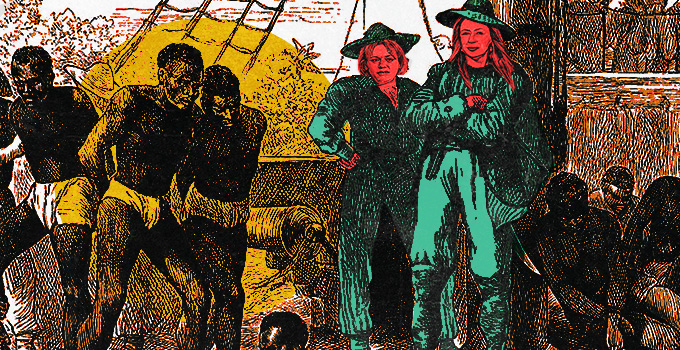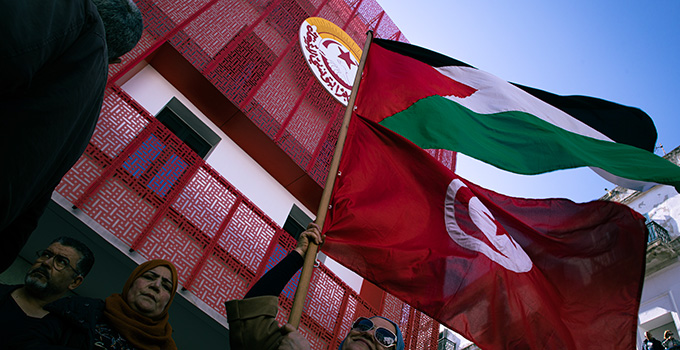In the months after the 2011 Tunisian uprising, the Islamist party Ennahda emerged from the shadows of repression to win a comfortable victory in the first free elections, dominating in urban Tunis almost as much as it did in rural Tataouine. The party soon became the most important actor in the democratic transition. But now, in the face of a sharp authoritarian reversal, Ennahda faces its most serious crisis in decades.
Nearly two dozen of the party’s top figures, including its founder-leader Rachid Ghannouchi, aged 82, are in jail. Several face security and terrorism charges. In February, Ghannouchi himself was sentenced to three years in prison on charges of accepting foreign funding. The arrests of Ennahda leaders are part of a broad regime crackdown that followed the July 2021 coup, when Kais Saied, the elected president, seized full power. Among those arrested are politicians from across the political spectrum, journalists, lawyers, and civil society activists. International rights groups have condemned the wave of repression. ‘The imprisoning of dissidents and the subjugation of the judiciary are more severe today than at any time since the revolution of 2011,’ Salsabil Chellali, Tunisia director at Human Rights Watch, warned in January.
Repression is the most urgent crisis for Ennahda, but it is not the only challenge. Long-running internal disagreements surfaced in September 2020, when 100 party members published a rare open letter complaining of tactical confusion, poor electoral performance, and internal paralysis. They called on Ghannouchi to resign and to allow a new generation to lead. A year later, most of the signatories quit the party. Today, Ennahda is treated with such suspicion by other political parties that it has struggled to build a broad opposition alliance to campaign for the restoration of democracy.

This is an acute shock for Ennahda, but it fits a broader regional pattern. Electoral Islamist parties are facing a crisis of legitimacy. In Egypt, the Muslim Brotherhood, once a model for Islamists elsewhere, has been severely repressed and driven into exile, following Abdel Fattah el-Sisi’s counter-revolutionary coup in 2013. In Morocco, the Party of Justice and Development was divided by internal disputes and then almost entirely wiped out in elections in 2021, after a decade in power. In Jordan, the Muslim Brotherhood has become fragmented after the emergence of a reformist faction. A decade after the Arab uprisings, the Islamist political project is in decline. Scholars once argued that Islamist parties enjoyed a political advantage at the ballot box because of a reputation for good governance earned through their social service provision. Yet today these parties are electorally weak and socially demonized. Islamists have struggled to give intellectual coherence to their democratic but unsecular policy ambitions. Their previously close-knit social movements have become political parties riven by factional disputes. Even Ennahda, regarded as the most adaptable of all Islamist parties, has experienced the same fate. How did Ennahda slide from electoral success back to repression in prison so quickly? And what comes next?
Ennahda and the Revolution
The speed at which Ennahda rebuilt itself after the fall of the Ben Ali regime on 14 January 2011 was remarkable. Thousands of its members had been jailed as political prisoners from the early 1990s onwards and suffered what the scholar Béatrice Hibou called the ‘social death’ of administrative control, designed to ostracize the Islamists in their own society. But within months they reconnected, established local bureaux across the country, and used their revived organizational capacity to win the first elections since the fall of the authoritarian regime.

There are contrasting explanations of what happened next. Under the leadership of Ghannouchi, Ennahda went through a major intellectual revision, much studied by scholars abroad even as it failed to persuade many Tunisians at home. The party advocated Islam as a ‘supreme centrist reference’ in its first electoral manifesto, but soon acknowledged it would have to compromise on its Islamist policy ambitions. Under pressure, it made a series of concessions. It dropped an early proposal to identify the Islamic Sharia as a fundamental source of legislation in the new constitution, it gave up an attempt to outlaw blasphemy, it reversed its position that women had a role that was merely ‘complementary’ to men, and it withdrew a proposal to state explicitly that Islam was the religion of state. The party then chose not to back a law that would have prevented former regime officials from contesting elections, and in 2014 it agreed to govern with its rival Nidaa Tounes, a party that effectively represented the political and business interests of the former regime. These concessions and reconciliations were presented by Ghannouchi as a bold new departure from Islamism, and praised as a pioneering effort to articulate a pluralist Muslim democratic project.
However, ideology is rarely a good predictor of political behaviour, and the party’s intellectual revisions alone do not explain Ennahda’s rise and fall. In interviews, Ennahda members always argued their primary goal was not to maximize votes but to avoid repression and to win acceptance as a regular political party like any other. This explains the ‘consensus’ approach that guided Ghannouchi’s decision making. ‘We were and unfortunately we still are defending our presence,’ Ghannouchi said to me in an interview in his party office in August 2022, just months before he was arrested. ‘When your presence is threatened your major problem becomes how to guarantee your existence.’

But the consensus approach came with a serious cost: it imposed a conservative democratic transition. Political leaders, including from Ennahda, prioritized political reforms, like a new constitution and transparent elections, ahead of the redistributive social and economic change that Tunisians had demanded in their calls for ‘dignity’ in the uprising. Successive governments struggled to curb corruption, to create sustainable jobs, to collect taxes, to tackle regional inequalities, and to reform the security forces. A promising transitional justice process was undermined by legislation to protect business elites, and politicians from all parties failed to agree on the formation of the Constitutional Court, which might have safeguarded against the current democratic backsliding. These reforms could not be left to technocrats. Instead, they required political will to push back against entrenched interests.
Within Ennahda, the party’s handling of this consensus strategy rapidly became a much more serious problem than the ideological concessions it had made. Many senior figures warned that consensus had trapped them in a risk-averse stance. ‘With time, Ennahda became a prisoner of rule’, said one senior Ennahda leader, who resigned from the party in 2020. Another former senior member said: ‘This was stability at the expense of embarking on reforms.’ Internal critics said the party should have accepted defeat in the 2014 elections and sat in opposition. Instead, Ennahda prioritized taking a role in successive coalition governments, even if it held few ministries and introduced few significant reforms. Nor did this strategy bring an electoral reward. Despite the ideological compromises and the strategic alliances, Ennahda’s vote share continued to decline. Where it had won nearly 35% of the vote and 89 seats in the assembly in 2011, it attracted just 19% and 52 seats in the 2019 elections.
Consensus politics gave an impression of stability that cloaked what had become a highly contested transition. Popular protests over demands for jobs, social justice, transparency over natural resources, and dignity increased in frequency from 2014. At the same time, trust in political parties dropped, as citizens turned against the politicians who had failed to deliver on their promises. Some parties almost disappeared, including the Congress for the Republic and Ettakatol, which had governed alongside Ennahda from 2011, and Nidaa Tounes, which had partnered with Ennahda from 2014. In a survey shortly before the 2021 coup, the respected polling organisation Arab Barometer found as many as 80% of respondents in Tunisia had no trust or not very much trust in government. Saied successfully leveraged this widespread frustration with politicians to advance his populist cause.
It’s not you, it’s them: the populist appeal of Kais Saied
President Kais Saied's time in power has been anything but uneventful. However, his claims of speaking for 'the people,' his hatred of any institution that stands in his way and his endless conspiracies, which dominate the public conversation while the economy sinks, all have parallels. They're there in Donald Trump, Hugo Chavez and even Silvio Berlusconi.
Internal Divisions
Ennahda is often demonized in the Tunisian media as an alien and radical actor, but these caricatures shed little light on how the party actual operates. Ennahda is what the scholar Luca Ozzano calls a ‘religiously-oriented party’, meaning that it draws on an Islamic reference and appeals to religious communities. It was originally a religious social movement that became first a conservative mass party and then tried to operate as a catch-all party, diluting its ideology and appealing to voters of all kinds. It accepts secular democratic institutions and political pluralism. Long gone is the ambition to establish an Islamic state under Sharia law.
However, this change in party identity was not straightforward. Ennahda made pragmatic concessions and reconciled with rivals to maintain its place in the political system. But this was hard to explain to ordinary members of the party, who were often puzzled by what seemed like an opportunistic and costly political strategy. The more Ennahda operated like a pragmatic, professional party, the more ordinary members felt overlooked and the less it felt to them like the close-knit social community of the past. Under Ghannouchi, the leadership tried to manage these competing challenges by imposing its views on the rest of the party, hoping that his charisma would be enough to keep the doubters on board. But it proved much harder than expected.
In 2016, in an internal evaluation report, Ennahda admitted it was suffering from ‘weak institutionalization’ and ‘excessive centralization’ of leadership. Reformists tried to limit Ghannouchi’s personal power. During the party congress that year, they moved unsuccessfully to change the rules to widen the diversity of views in the powerful Executive Bureau. Then when the party chose candidates for the 2019 elections, the leadership removed dozens of reformists from top positions on constituency party lists. ‘We felt there was a generational blockage. There was no access for young people to the leadership,’ one former Shura Council member told me. Many felt their critique of the party’s strategic choices and government performance were ignored. They were especially worried when Ghannouchi, by then a highly polarizing figure on the political scene, ran for a seat himself in the 2019 elections and became speaker of the assembly. ‘We joined a political party to install democracy and later we found there was a problem of internal democracy,’ said one former Ennahda candidate who later resigned. ‘The question was how to take decisions: do we take collective decisions or does someone take decisions and we obey?’ The problem for Islamist parties is that the charismatic, historic leaders who played such a crucial role in the early years, mobilizing support and building dense networks of belonging, eventually need to be replaced by new leaders with different skills and who are better attuned to the challenges of running a professional political party.
These internal frustrations culminated in an open letter published in September 2020 and signed by more than 100 members of Ennahda, including members of the Political Bureau, the Shura Council, and elected members of the assembly. They warned that extending Ghannouchi’s term in office as if he was a ‘president-for-life’ undermined the credibility of the movement and prevented cooperation with other parties. The letter called for ‘leadership alternation’ so that a new generation could step up.

The obvious solution was to hold a party congress, acknowledge that Ghannouchi had served his maximum two terms as leader, and elect a new party president. But the congress, which was originally due in 2020, has been repeatedly delayed. One senior Ennahda figure told me many in the party were worried that a new leader in the ‘post-Rachid’ phase might struggle to command the confidence of the whole party and that an unconvincing leadership election might precipitate an even worse split. Some proposed electing a president and two vice-presidents who would try to run the party together. Others argued for a transitional leader, to lead the party for a short term and to focus solely on introducing major internal organisational and policy reforms. ‘We need a pause for reflection,’ said one current senior Ennahda leader. ‘We need to evaluate our experience in government. We must examine the mistakes we made and how we overcome them. What is our long-term vision for the future?’
The Future of Ennahda
In the first months after the July 2021 coup, Ennahda hoped to avoid sliding into a direct confrontation with Kais Saied’s new regime. Instead, it calculated the mounting economic crisis would eventually force a negotiated return to the democratic process. However, the new regime proved more resilient and popular than expected, reinforced by financial support from Saudi Arabia, Algeria, and the EU, even as it cracked down on political dissent at home.
EU-Tunisia: Why the Dutch were compelled to strike a deal with an autocrat
On July 16, the European Commission signed a 'Memorandum of Understanding’ with Tunisia, granting the country millions of euros to prevent migrants and refugees from crossing the Mediterranean to seek shelter in Europe. But why did the Dutch prime minister play a pioneering role in the conclusion of the Tunisia deal, if only a small proportion of the migrants along this route travel on to the Netherlands? This analysis examines how the Dutch anti-migration policy became self-evident.
Among those arrested from Ennahda alongside Ghannouchi were some of its most influential veteran activists: Said Ferjani, an elected representative and close advisor to Ghannouchi, Ali Laarayedh, the former prime minister, Nourredine Bhiri, the former justice minister, Abdelhamid Jelassi, the party’s former vice-president, Riadh Bettaieb, the former investment minister, Mohamed Ben Salem, the former agriculture minister, Mondher Ounissi, the party’s interim leader after Ghannouchi’s arrest, and Abdel Karim Harouni, head of the party’s Shura Council. Many of these men had previously been jailed and tortured under the Ben Ali regime. Ennahda campaigns for the release of all political prisoners, but it has struggled to build a collective movement with other political parties, not least because Ghannouchi remained such a polarizing figure.
After the coup, more than 100 of those who signed the open letter critical of Ghannouchi in September 2020 resigned, led by the former health minister Abdellatif Mekki. Some went on to join Mekki’s new Party of Work and Achievement, which appealed to a socially conservative electorate but without calling on an Islamic reference. In June last year, Mohamed Goumani, a senior leader who had managed Ennahda’s response to the coup, also left the party, saying it needed to go through a period of self-criticism and renewal. Ennahda has been shut out of its offices, leaving leaders to issue statements on social media and to organise demonstrations in support of political prisoners. The party boycotted the constitutional referendum in July 2022, which produced a new, hyper-presidential political system, and it boycotted subsequent national and local elections. However, it was unable to gain much leverage from the boycotts. Now Ennahda leaders have suggested the party may change strategy and support an opposition candidate in the presidential election expected late this year.
Ennahda is a much-diminished political force, but it has not been erased from the political scene and it still commands a significant minority of support. As the party tries to rebuild itself, it is likely to move even further away from its ideological Islamist roots towards becoming a catch-all socially conservative, economically liberal party. Ajmi Lourimi, the party’s secretary-general, has floated the idea of changing the party’s name and relabelling its Shura Council as a National Council in an effort to attract a more diverse, less ideological support base. After all, the internal crisis the party has faced has not been because of its ideological flexibility, which most members have accepted, but because of its strategic choices, its poor performance in government, and its highly centralised leadership. It still struggles to overcome what one current party member described as ‘exclusive polarisation’ on the political scene. These are the key areas the party will have to address, while at the same time campaigning for the release of its imprisoned leaders and for a ‘national dialogue’ leading to the restoration of a democratic process.

It is tempting to think of Ennahda’s fall as a uniquely Tunisian problem, the demise of what was often described as the Tunisian ‘model’. But in the case of the Islamists, Ennahda’s trajectory from electoral triumph to exclusion and repression is all too familiar. Research suggests Islamist movements are declining in political, societal, and cultural influence and facing increasing political polarization. Morocco’s Party of Justice and Development was the first party in the kingdom to win two consecutive elections, yet it too entered into awkward political alliances and difficult policy compromises. It resolved internal divisions by holding a quick and decisive leadership election, but today it is a much smaller political force. Under its leader Abdelilah Benkirane, it has returned to an older politics of Islamic identity to revitalise its base. Jordan’s Muslim Brotherhood faced its own internal divisions triggered by a reformist faction, the ZamZam initiative, which precipitated a fragmentation of the organisation. The Jordanian monarchy then intervened to widen these divisions and to weaken decisively a key political actor. The Egyptian Muslim Brotherhood is in an even more parlous state, driven into exile after severe repression at home, divided by debates over strategy, and surviving by relying on longstanding personal networks. Islamists from all these organisations and more still meet regularly to compare experiences and to debate future strategies. For them, the Tunisian case matters, because it seems to show that even behavioural and ideological moderation are no guarantee against repression. There is a risk that Ennahda’s experience may discourage other Islamists from pursuing the same path.
Is there even a constituency left that supports an Ennahda project? Although personal religious observance remains high, Tunisians seem wary of the idea that religion should influence political life. In a 2021-22 Arab Barometer survey, 72% of Tunisian respondents said they regarded religious practice as a private matter that should be separate from social and economic life. Asked if they wanted laws based on the will of the people or the Islamic Sharia, an overwhelming majority wanted laws either entirely or mostly based on popular will, or equally based on popular will and the Sharia. A majority did not think the country would be better off if religious people held public positions in the state. Trends like this are encouraging some former Ennahda loyalists to rethink their political project in non-religious, but conservative centre-right terms. As Mekki, who led the split from Ennahda in 2021 and then set up his own party, told me: ‘Islam has become a source of cleavage. Conservatism is a way of opening a new vision.’
Yet, religious identities retain a potent mobilizing force. Some political entrepreneurs are trying to outbid Ennahda from the right. The Karama Coalition, under its leader Seifeddine Makhlouf, appeals to the goals of the uprising and to socially conservative religious causes, and won nearly 6% of the vote in the 2019 elections and 21 seats in the assembly. Kais Saied himself has introduced a much more assertive role for religion in his new 2022 constitution. In Article 5, the constitution defines Tunisia as part of the Islamic nation and empowers the state to work to achieve ‘the higher objectives of true Islam’, the ‘maqasid’. Here Saied went further than Ennahda had ever done in bringing Islamic elements into the constitution, and almost seemed to codify religion as positive law, though his meaning was perhaps intentionally ambiguous. This was Saied competing to monopolise religious authority, like authoritarians across the region, and to ensure the political survival of his socially conservative regime.
Ennahda, like other Islamist groups, has survived long periods of repression in the past, and has proven to be a highly adaptable political organisation. It is unlikely to disappear, though it may have to reinvent itself once again. But the more urgent challenge for Ennahda, and all other opposition parties, is to present a viable political alternative to the current regime. At a time when Tunisians are increasingly disengaged from politics and disillusioned with the promises of democracy, this may yet prove the greatest challenge of all.






Certains sont comme le moustiques “tigre” ou les moustiques “tse-tse”. Il pèsent moins qu’une mouche mais font beaucoup de dégâts.